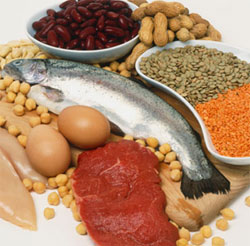|
|
|
 , ,
Font size |
Lift your Spirits via Food
 The
food
you eat affects your mental health as well as your physical well-being. A bad
diet can be one of the causes of
depression on food
swings. A
healthy diet, on the other hand, may be enough to lift your spirits without
the need for medication and counseling. The
food
you eat affects your mental health as well as your physical well-being. A bad
diet can be one of the causes of
depression on food
swings. A
healthy diet, on the other hand, may be enough to lift your spirits without
the need for medication and counseling.
Nutrition
may not be the whole answer, but there is evidence that diet can affect the
balance of mental and physical well being. Many experts now believe that
drugs and medication are not always the solution to mild depression and a
positive self-help approach can be beneficial in many cases.
Restoring The Balance
Depression
is closely connected with the food you eat. People who are depressed often lose
their appetite, feel too low to cook, and eat junk food. A vicious circle
develops poor eating habits lead to nutritional deficiencies which then increase
feelings of depression. Doctors have discovered that many people who suffer from
depression are also lacking in particular nutrients.
Eating
foods
rich in these missing nutrients, combined with lifestyle changes and regular
exercise, can produce
significant improvements in people suffering from mild to moderate depression.
Sometimes, better results have been achieved than with prescribed
antidepressants.
Foods to beat the blues
If you are feeling depressed, your first priority should be to eat a
nutritionally
balanced diet. You should also increase your intake of the following
nutrients, which have been linked with depression.
 The
B vitamins People who are depressed tend to have lower levels of
vitamin B6,
which is needed for the production of serotonin, the brain chemical that lifts
mood. Low levels of
vitamins B12,
B2 (riboflavin)
and folic acid can also cause depression. To boost your B vitamins, eat lean
meat and poultry, fish, eggs, nuts, seeds, soya beans, bananas, low-fat dairy
produce, fortified cereals and leafy green vegetables. The
B vitamins People who are depressed tend to have lower levels of
vitamin B6,
which is needed for the production of serotonin, the brain chemical that lifts
mood. Low levels of
vitamins B12,
B2 (riboflavin)
and folic acid can also cause depression. To boost your B vitamins, eat lean
meat and poultry, fish, eggs, nuts, seeds, soya beans, bananas, low-fat dairy
produce, fortified cereals and leafy green vegetables.
Vitamin
C: is also depleted in people suffering from depression. Eat plenty of
fresh, raw fruits and vegetables: citrus fruit, strawberries, guavas, kiwifruit,
blackcurrants and peppers are excellent sources.
Iron:
A deficiency in iron may lead to depression. Iron is also essential in the
production of the brain chemical serotonin. Women who take the birth-control
pill are more prone to depression if their iron levels are low. Foods rich in
iron include red meat, egg yolk, liver, red kidney beans, chickpeas, whole
grains, fortified breakfast cereal, nuts, pulses and green leafy vegetables. But
if you are pregnant or trying to conceive you should not eat liver.
Selenium:
People who are deficient in the antioxidant mineral selenium also experience
feelings of depression and
anxiety. Selenium
is found in meat, fish and shellfish, whole grains, avocados and dairy produce.
Zinc:
Essential for the body to convert tryptophan into serotonin. Zinc is found in
oysters, red meat, poultry, eggs, dairy foods, peanuts and sunflower seeds.
Other minerals
that help to fight depression include magnesium and manganese. These are found
in wholegrains, pulses, dried figs, vegetables, nuts and seeds.
Omega-3
fatty acids Research is still in its early stages, but depression has been
linked to omega-3 deficiency. Scientists suggest that these fatty acids may be
able to suppress the signals that are responsible for sudden mood changes.
Omega-3 oils may offer new possibilities for treating manic depression. Oily
fish such as salmon, herrings, mackerel, tuna and sardines are the richest
sources of omega-3 fatty acids.
Refresh your spirits with fennel. With its delicate aniseed flavor and
crunchy texture, it is a perfect accompaniment to fish, boosts your body�s
supplies of
antioxidants, and fortifies your
immune system.
The role of antioxidants
As well as helping to prevent disease such as cancer,
antioxidants may be useful for helping people who are
vulnerable to bouts of depression. This has been
highlighted in recent studies. Vitamin C in particular
can help those with mood disorders. After two years of
taking supplements of antioxidant nutrients, patients
were found to be significantly less depressed than those
who were taking a placebo.
|
|
 Eat
small, regular meals to keep your blood sugar levels on an even level and avoid
high sugary snacks. Instead, try snacking on unsalted popcorn or pretzels,
home-made ice lollipops made with real fruit, crumpets with yeast extract or
peanut butter, and muffins with high-fruit jam. Eat
small, regular meals to keep your blood sugar levels on an even level and avoid
high sugary snacks. Instead, try snacking on unsalted popcorn or pretzels,
home-made ice lollipops made with real fruit, crumpets with yeast extract or
peanut butter, and muffins with high-fruit jam.
In addition, you may want to try the following ideas:
-
Eating one or two ripe bananas a day can increase levels if the mood
enhancing chemical serotonin.
-
If you dislike oily fish, take a daily fish oil supplement.
-
Just one Brazil nut a day can help to make you feel good. They are a
very good source of selenium.
-
Use more chilies in your cooking: capsaicin, the substance which makes
chilies hot, stimulates the release of endorphins, the body�s �feel good�
chemicals.
Life-style factors
Though nutritional deficiencies are common in people suffering from depression,
these are not always the result of unwise eating habits. Alcohol, caffeine and
cigarettes are very efficient at stealing nutrients from the body. An excess of
these stimulants (they are also called antinutrients), has been linked with
depression and low mental energy.
Cigarettes
Smoking lowers vitamin C levels in the body, and this can contribute to
depression. In addition, it interferes with serotonin receptors in the brain,
making them less sensitive to the mood-enhancing serotonin that is available.
Alcohol
is a depressant- it interferes with the brain-cell processes and disrupts sleep.
It also produces a fall in blood sugar levels, resulting in cravings for sweet,
sugary foods. The subsequent extremes of high and low blood sugar levels tend to
aggravate any emotional problems.
Caffeine
is a mood enhancer, so it can make matters worse for those susceptible to
anxiety and mood swings. The combination of caffeine and refined sugar seems to
cause even more dramatic mood changes.
Dated 01 May 2014
Related Links
|
|
|
|
|









